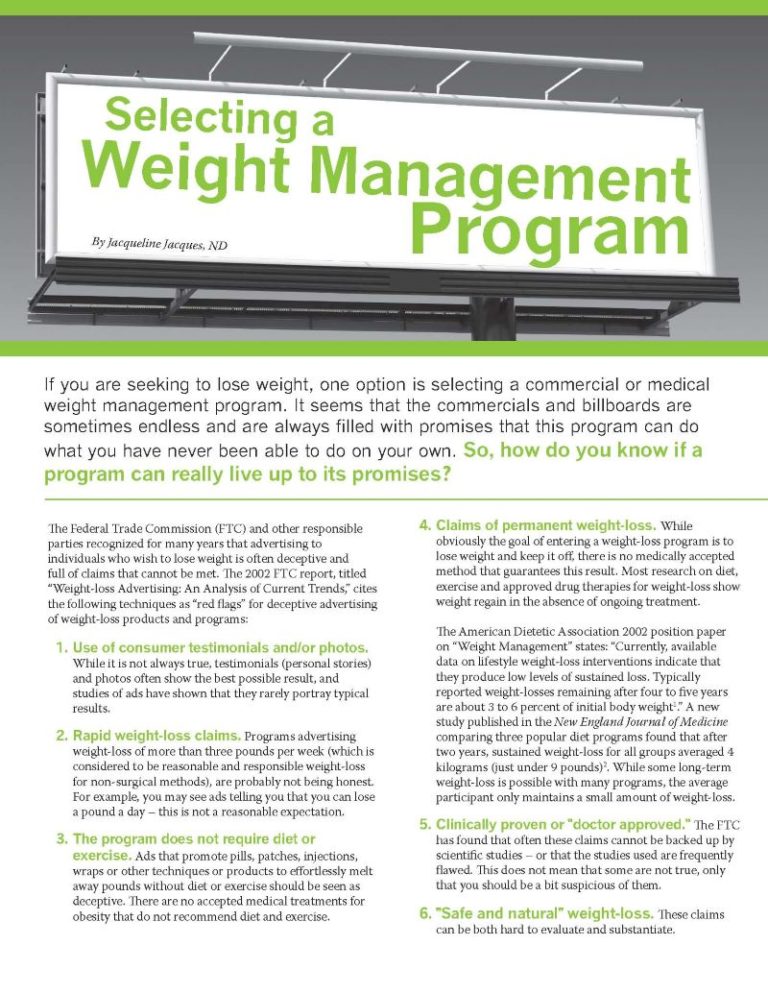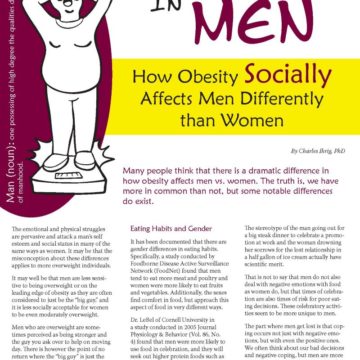Selecting a Weight Management Program


by Jacqueline Jacques, ND
Summer 2009
If you are seeking to lose weight, one option is selecting a commercial or medical weight management program. It seems that the commercials and billboards are sometimes endless and are always filled with promises that this program can do what you have never been able to do on your own. So, how do you know if a program can really live up to its promises?
The Federal Trade Commission (FTC) and other responsible parties recognized for many years that advertising to individuals who wish to lose weight is often deceptive and full of claims that cannot be met. The 2002 FTC report, titled “Weight-loss Advertising: An Analysis of Current Trends,” cites the following techniques as “red flags” for deceptive advertising of weight-loss products and programs:
- Use of consumer testimonials and/or photos. While it is not always true, testimonials (personal stories) and photos often show the best possible result, and studies of ads have shown that they rarely portray typical results.
- Rapid weight-loss claims. Programs advertising weight-loss of more than three pounds per week (which is considered to be reasonable and responsible weight-loss for non-surgical methods), are probably not being honest. For example, you may see ads telling you that you can lose a pound a day – this is not a reasonable expectation.
- The program does not require diet or exercise.Ads that promote pills, patches, injections, wraps or other techniques or products to effortlessly melt away pounds without diet or exercise should be seen as deceptive. There are no accepted medical treatments for obesity that do not recommend diet and exercise.
- Claims of permanent weight-loss. While obviously the goal of entering a weight-loss program is to lose weight and keep it off, there is no medically accepted method that guarantees this result. Most research on diet, exercise and approved drug therapies for weight-loss show weight regain in the absence of ongoing treatment.
- The American Dietetic Association 2002 position paper on “Weight Management” states: “Currently, available data on lifestyle weight-loss interventions indicate that they produce low levels of sustained loss. Typically reported weight-losses remaining after four to five years are about 3 to 6 percent of initial body weight1.” A new study published in the New England Journal of Medicine comparing three popular diet programs found that after two years, sustained weight-loss for all groups averaged 4 kilograms (just under 9 pounds)2. While some long-term weight-loss is possible with many programs, the average participant only maintains a small amount of weight-loss.
5. Clinically proven or “doctor approved.” The FTC has found that often these claims cannot be backed up by scientific studies – or that the studies used are frequently flawed. This does not mean that some are not true, only that you should be a bit suspicious of them.
6. “Safe and natural” weight-loss. These claims can be both hard to evaluate and substantiate.
Finding a Program You Can Trust
So how do you find a program that you can trust? Several organizations including the Weight Control Information Network (part of the National Institute of Diabetes and Digestive and Kidney Disease – NIDDK) and the National Heart Lung and Blood Institute (NHLBI) created guidelines for consumers selecting a weight-loss program. While the guidelines differ somewhat, the following is a general list of what they suggest:
- Find a program that offers counseling or education. Counseling and education in either a one-on-one or group setting has been shown to be beneficial for making healthy, life-long change. It is also helpful to have this kind of support to manage stress.
- Seek a program with a professional staff such as physicians, nurses, counselors, exercise physiologists and dietitians. This is especially important if you have other health concerns, are taking medications that may require management or are seeking to lose more than 20 pounds. The program does not have to be overseen by a doctor, but if it is not, you will want to know if they will work with your doctor to address health issues that may arise.
- Does a health professional help you set weight and health goals and supervise your progress? A good program will help you set goals that are both safe and attainable and base them off of your personal needs.
- If the program requires a regimented diet, consider whether it is something that you can really do. Can you afford the foods? Are they easy to obtain or prepare? If you have dietary or allergic restrictions, can you participate? Does the program help you learn good habits for the future?
- Does the program offer a follow-up or maintenance program to help you keep weight off or assist you if you have weight regain? One thing that long-term studies about weight-loss have show is that people tend to regain weight throughout time. For this reason, having a requirement or an option for ongoing support can be very beneficial.
- What are the risks of the program? You may want to evaluate this with your doctor. If the program requires things such as medications or a significantly altered diet, there could be risks to your health that you are not aware of. You would also want to know how the program manages these potential risks – for example, by working with your doctor, following lab tests or other means.
- Does the program have research that supports its technique and/or publications that explain the program, its philosophy and methods? Some programs, for example Weight Watchers, have been studied and published data on their long-term outcomes.
- Is the program affordable? If you are going to participate in a program for weeks, months or even years, you will want to assess the cost. Some costs to consider are the costs of enrollment, visits with healthcare professionals, medications, supplements and foods.
The NIDDK and NHLBI suggest asking these questions:
- What percent of people complete the program?
- How much weight does the average participant lose? How much weight do they keep off?
- How many people have problems and side effects, and what are they?
- Are there additional costs for foods, supplements, weekly meetings, lab work, etc.?
There are many good options available to those seeking to lose weight. It is always a good idea to talk to your doctor before you engage in a weight-loss program to discuss your personal health risks, needs and goals. Remember, be aware of advertising that simply sounds too good to be true – it probably is!
About the Author:
Jacqueline Jacques, ND, is a Naturopathic Doctor with more than a decade of expertise in medical nutrition. She is the Chief Science Officer for Catalina Lifesciences LLC. Dr. Jacques is a member of the OAC National Board of Directors.
References:
1 Weight Management. J Am Diet Assoc. 2002;102:1145-1155
2 Sacks FM, et al. Comparison of Weight-loss Programs with Different Compositions of Fat, Protein and
Carbohydrate. N Engl J Med. 2009 Feb 26;360(9):859-73.
by Kendall Griffey, OAC Communications Manager Spring 2024 We have officially kicked off Your Weight Matters Regional…
Read Articleby Robyn Pashby, PhD Winter 2024 “No one is ever going to date you if you don’t…
Read Articleby Kendall Griffey, OAC Communications Coordinator Winter 2024 The Obesity Action Coalition’s 12th annual Your Weight Matters…
Read Article









